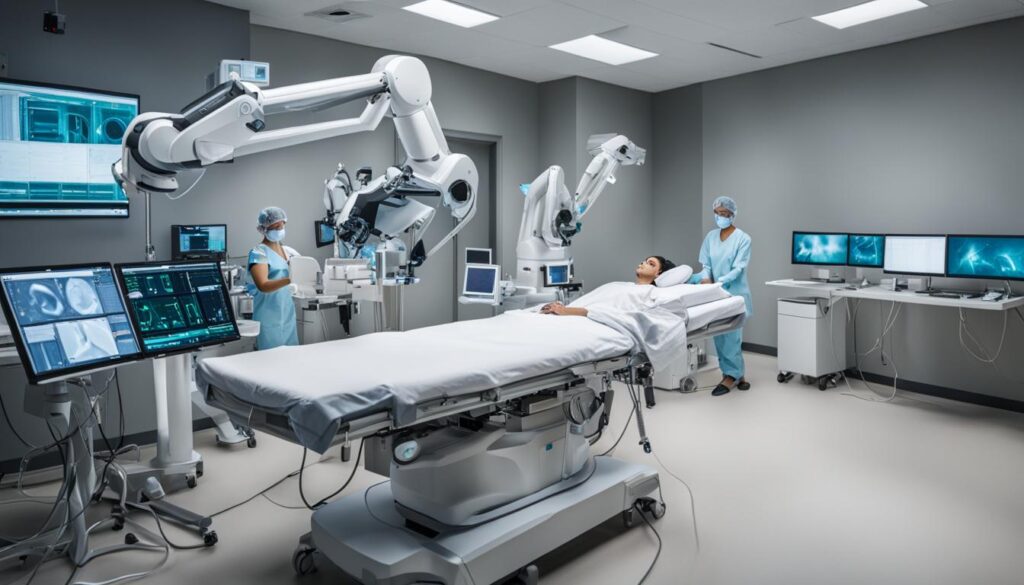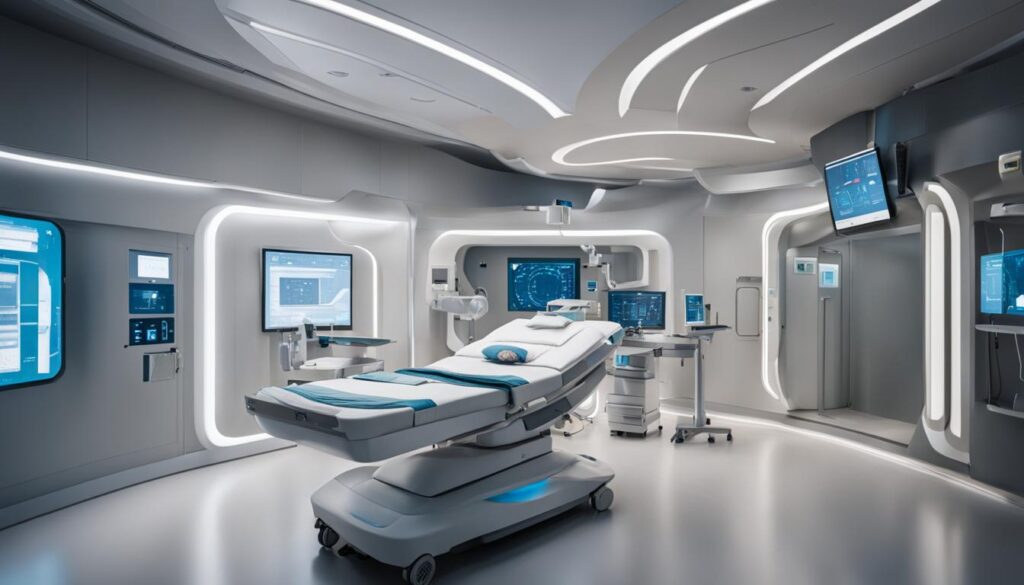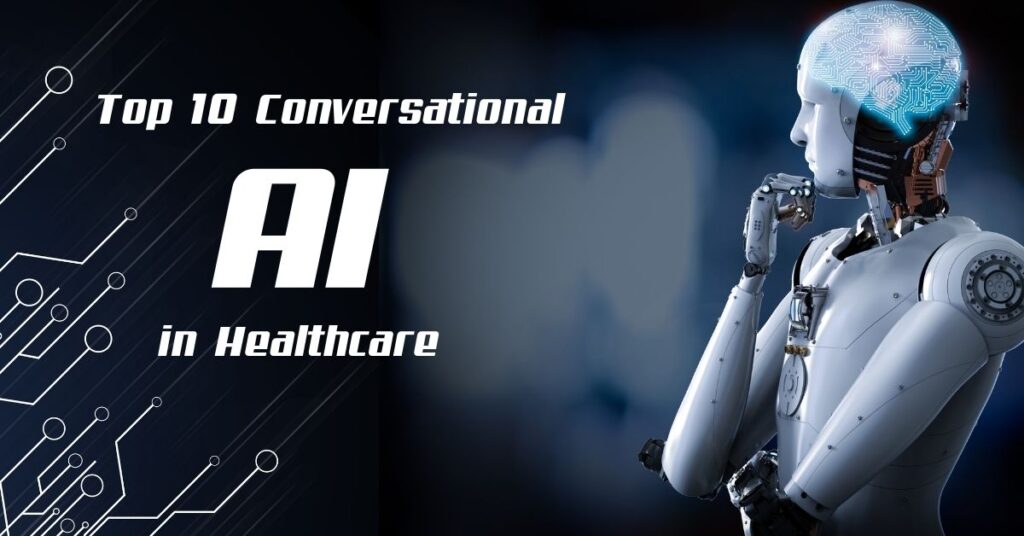
Welcome to our comprehensive guide on AI-powered patient care and its profound impact on the healthcare industry. In this article, we will explore how artificial intelligence (AI) is driving innovation in healthcare, revolutionizing patient-centered care through advanced technology and personalized medicine.
AI is transforming healthcare by leveraging cutting-edge technologies such as natural language processing, machine learning, and digital health solutions. These advancements are enabling healthcare professionals to effectively automate patient care, leading to improved treatment outcomes, enhanced diagnostics, and streamlined clinical workflows.
By harnessing the power of AI, healthcare systems can benefit from automated patient care processes, such as intelligent diagnosis and treatment recommendations, patient engagement and adherence, and administrative activities. AI systems can analyze vast amounts of patient data, identify patterns, and provide valuable insights that support clinical decision-making.
AI-powered patient care offers numerous advantages, including enhanced accuracy, increased efficiency, and cost savings. With machine learning algorithms, healthcare providers can deliver personalized care plans that cater to individual patient needs. This personalized approach promotes better patient outcomes and reduces the risk of errors.
As we delve deeper into the applications of AI in healthcare, we will also address the ethical considerations and challenges associated with its implementation. It is important to ensure responsible and ethical use of AI technologies to maintain patient privacy, address biases, and uphold the vital role of human expertise and judgment.
In the following sections of this article, we will explore the types of AI technologies in healthcare, the various applications of AI in patient care, the role of AI in clinical practice, the future of AI in healthcare, and the benefits and limitations of this transformative technology.
Join us on this informative journey as we uncover the incredible potential of AI-powered patient care and the ways in which it is revolutionizing the healthcare landscape. Together, we can unlock a future of advanced technology, patient-centered care, and improved health outcomes for all.
Types of AI Technologies in Healthcare
Artificial intelligence (AI) is a diverse field that encompasses various technologies, each with its own unique capabilities and applications in healthcare. These technologies play a crucial role in enhancing patient care, clinical decision-making, and administrative processes. Let’s explore some of the key AI technologies used in healthcare.
Machine learning is a fundamental AI technology that involves the development of algorithms to analyze and learn from data. It enables computers to make predictions or recommendations based on patterns and relationships identified in large datasets. In healthcare, machine learning algorithms are used for tasks such as clinical decision support, disease diagnosis, and treatment recommendations.
Another important AI technology in healthcare is precision medicine, which leverages patient attributes, genetic information, and treatment context to predict the success rates of personalized treatment plans. By combining patient data with AI algorithms, healthcare professionals can deliver targeted therapies and improve patient outcomes.
Neural networks and deep learning are advanced forms of machine learning that mimic the structure and function of the human brain. These technologies enable the creation of complex models with multiple layers of interconnected nodes, allowing for more accurate predictions and insights. Neural networks and deep learning algorithms are particularly useful in healthcare for tasks such as image recognition, disease detection, and risk prediction.
Natural language processing (NLP) focuses on understanding and generating human language. It enables computers to analyze and interpret unstructured text data, such as clinical notes and patient reports. NLP techniques are used in healthcare for tasks such as automated transcription, information retrieval, and sentiment analysis.
Rule-based expert systems are another category of AI technologies used in healthcare. These systems rely on predefined rules and logical reasoning to provide clinical decision support. They are particularly useful for automating repetitive and standardized tasks, such as data entry and documentation in electronic health record systems.
Besides software-based AI technologies, physical robots and robotic process automation (RPA) have also found applications in healthcare settings. These physical machines can assist in various tasks, such as medication delivery, patient monitoring, and surgical procedures.
AI technologies are revolutionizing healthcare by leveraging data and advanced algorithms to augment clinical decision-making, improve patient outcomes, and enhance the efficiency of healthcare delivery. The combination of machine learning, neural networks, deep learning, natural language processing, rule-based expert systems, and physical robots is transforming the way healthcare is provided, making it more personalized and efficient.
Related Post: The Top 10 Conversational AI for Healthcare in 2024
Applications of AI in Healthcare
Artificial Intelligence (AI) is revolutionizing healthcare by offering numerous applications that improve patient care and enhance clinical decision-making. One of the key areas where AI excels is in disease diagnosis. By leveraging large datasets and advanced algorithms, AI can assist in diagnostics by identifying patterns that surpass human performance. AI tools have shown exceptional accuracy in detecting diseases such as breast cancer and skin cancer, often outperforming human experts.
Another valuable application of AI in healthcare is the development of personalized treatment plans. By analyzing patient data and treatment history, AI algorithms can provide recommendations for personalized treatment options. This ensures that patients receive the most effective and appropriate care based on their unique circumstances.
Additionally, AI has the potential to support clinical decision-making by providing healthcare professionals with evidence-based insights and recommendations. AI algorithms can analyze patient data, medical literature, and treatment guidelines to assist in making informed decisions about diagnosis, treatment, and care management.
Virtual health assistants powered by AI are also gaining popularity in healthcare. These AI-driven assistants can provide patients with personalized health information, answer questions about symptoms or treatments, and even offer guidance on preventive care measures. This improves patient engagement and education, empowering individuals to take control of their health and make informed decisions.
Furthermore, AI plays a crucial role in population health management. By analyzing large sets of data from various sources, AI algorithms can identify patterns and trends that assist healthcare providers in monitoring and managing the health of entire populations. This enables proactive interventions and targeted healthcare strategies to improve population health outcomes.
Mental health care is another area that can benefit from AI. Virtual mental health assistants, powered by AI, can support individuals by providing resources, therapy reminders, and even real-time support for mental health concerns. This technology helps overcome barriers to mental health care access and augment traditional therapy methods.
While AI offers significant potential in healthcare, there are challenges that need to be addressed for responsible and effective implementation. Data privacy is a major concern, as AI systems rely on vast amounts of personal health data. Steps must be taken to ensure the secure and ethical use of this data to protect patient privacy.
Bias is another challenge associated with AI in healthcare. Algorithms can inadvertently perpetuate biases present in the data they are trained on, leading to disparities in diagnosis and treatment. Efforts must be made to identify and mitigate bias to ensure equitable and unbiased healthcare delivery.
Despite these challenges, the role of human expertise should not be overlooked. While AI can make accurate predictions and recommendations, the final decision-making should involve the input and critical thinking of healthcare professionals. Human expertise and clinical judgment are essential to validate AI-generated results and provide a holistic approach to patient care.
Overall, the applications of AI in healthcare are vast and promising. By harnessing the power of AI assistance in diagnostics, personalized treatment plans, clinical decision-making, and population health management, healthcare providers can enhance patient outcomes and transform the delivery of healthcare. Responsible implementation of AI technologies and addressing the challenges associated with privacy, bias, and human expertise are essential to ensure the successful integration of AI in healthcare.
The Role of AI in Clinical Practice
AI has the potential to revolutionize clinical practice by improving disease diagnosis, providing treatment recommendations, and enhancing patient engagement. With its ability to analyze large amounts of data and identify patterns, AI can lead to more accurate diagnoses and personalized treatment plans.
AI in clinical practice can assist healthcare professionals by processing vast amounts of patient data, including medical records, symptoms, and lab results, to generate insights and recommendations. This can help doctors make more informed decisions and provide tailored treatment options to their patients.
By integrating AI into healthcare, clinicians can leverage the power of advanced algorithms and machine learning models to improve diagnostic accuracy and treatment outcomes. AI systems can analyze complex datasets, identify subtle patterns, and predict disease progression, enabling early intervention and better patient management.
Furthermore, AI can enhance patient engagement by providing personalized health information, reminders, and support. Virtual health assistants powered by AI can deliver interactive and tailored patient education, promoting better understanding of medical conditions and treatment plans. This drives patient empowerment and encourages active involvement in their own healthcare journey.
However, the integration of AI into clinical practice raises important ethical considerations and legal implications. Clear guidelines must be established to ensure patient privacy, data security, and the responsible use of AI technologies. Healthcare organizations must navigate issues related to data privacy, bias in AI algorithms, and the need for human expertise to interpret and validate AI-generated results.
Responsible implementation of AI is crucial to optimize patient safety, improve healthcare outcomes, and foster trust in AI-enabled clinical practice. With careful consideration of ethical, legal, and privacy concerns, integrating AI in healthcare can unlock its full potential and pave the way for a more efficient and patient-centered healthcare system.
Figures in Clinical Practice
To illustrate the impact of AI in clinical practice, the figure below highlights the different stages where AI can assist in the diagnosis and treatment of diseases.
The Future of AI in Healthcare
The future of AI in healthcare holds immense potential for transforming healthcare delivery and improving patient outcomes. AI-augmented healthcare systems have the capability to overcome various challenges faced by the healthcare industry, including improving population health, enhancing the patient’s experience of care, and reducing the rising cost of care.
By leveraging real-world data and embracing technological innovations, healthcare organizations can effectively adopt AI technologies to drive healthcare transformation. AI has the ability to analyze large datasets and identify patterns that may go beyond human capabilities, leading to more accurate diagnoses, personalized treatment plans, and improved clinical decision-making.
However, it is crucial to address several challenges in the adoption of AI in healthcare. Data privacy and security concerns must be tackled to safeguard patient information and maintain trust in AI-augmented healthcare systems. Bias in AI algorithms needs to be minimized to ensure fair and unbiased healthcare outcomes.
Additionally, human expertise remains essential in interpreting and validating AI-generated results. The need for collaboration between healthcare professionals and AI systems is vital to ensure responsible and effective use of AI in healthcare.

Benefits and Limitations of AI in Healthcare
The use of AI in healthcare offers numerous benefits that can significantly enhance patient care and diagnostics. By leveraging large datasets and advanced algorithms, AI has the potential to improve treatment outcomes and reduce human errors, leading to improved patient outcomes. AI-powered diagnostics can analyze complex medical information and identify patterns that surpass human performance, enabling early detection of diseases and more accurate diagnosis.
Personalized medicine is another area where AI can make a significant impact. By analyzing patient attributes and treatment context, AI can develop tailored treatment plans for individuals, ensuring more effective and precise care.
The implementation of AI in healthcare also offers cost and time savings. AI-powered automation can streamline administrative tasks, increasing efficiency and reducing the burden on healthcare professionals. This allows healthcare providers to focus more on patient care and spend less time on paperwork and repetitive tasks.
However, it is essential to recognize the limitations and concerns associated with AI in healthcare. Data privacy concerns arise from the need to handle sensitive patient data, ensuring secure storage and transmission. Bias in AI algorithms can lead to disparities and inequality in healthcare outcomes, hindering the equitable delivery of care. Additionally, while AI can perform complex tasks, it still requires human expertise to interpret and validate the results, emphasizing the need for a collaborative approach between AI and healthcare professionals.
Conclusion
AI-powered patient care has the potential to revolutionize healthcare by enhancing personalized treatment, improving diagnostic accuracy, and transforming healthcare delivery. With the advancements in artificial intelligence, the future of healthcare looks promising. However, there are challenges and limitations that need to be overcome for responsible implementation.
Responsible implementation of AI technologies is crucial in order to address the challenges and ensure the effective integration of AI into clinical practice. It requires careful consideration of ethical and legal implications to protect patient privacy and safety. By doing so, AI-powered patient care can drive the transformation of healthcare, leading to improved patient outcomes.
As we continue to make progress in AI-powered patient care, it is important to overcome challenges such as data privacy and bias. By leveraging the potential of AI, we can enhance personalized treatment plans, improve diagnostic accuracy, and optimize healthcare delivery. The future of healthcare is bright, and with responsible implementation, AI has the power to truly transform the way we provide healthcare.
FAQ
What is AI-powered patient care?
AI-powered patient care refers to the application of artificial intelligence (AI) technologies in healthcare to enhance personalized treatment, improve diagnostic accuracy, and transform healthcare delivery.
What are the types of AI technologies in healthcare?
The types of AI technologies in healthcare include machine learning, neural networks, deep learning, natural language processing, rule-based expert systems, physical robots, and robotic process automation.
How is AI used in healthcare?
AI is used in healthcare to assist in disease diagnosis, develop personalized treatment plans, support clinical decision-making, enhance population health management, provide virtual health assistants, support mental health care, improve patient education, and influence patient-physician trust.
What is the role of AI in clinical practice?
The role of AI in clinical practice is to improve disease diagnosis, provide treatment recommendations, and enhance patient engagement. It can analyze large amounts of data to identify patterns for more accurate diagnoses and personalized treatment plans.
What is the future of AI in healthcare?
The future of AI in healthcare is promising, with the potential to transform healthcare delivery and improve patient outcomes. AI-augmented healthcare systems can address challenges such as improving population health, enhancing the patient’s experience of care, and reducing the cost of care.
What are the benefits of AI in healthcare?
The benefits of AI in healthcare include improved patient care, enhanced diagnostics, personalized medicine, cost and time savings, and reduced human errors. AI leverages large datasets and advanced algorithms to make accurate predictions and recommendations.
What are the limitations of AI in healthcare?
The limitations of AI in healthcare include concerns about data privacy, bias in algorithms, and the need for human expertise to interpret and validate AI-generated results. These limitations must be carefully considered and addressed for responsible and effective use of AI in healthcare.

